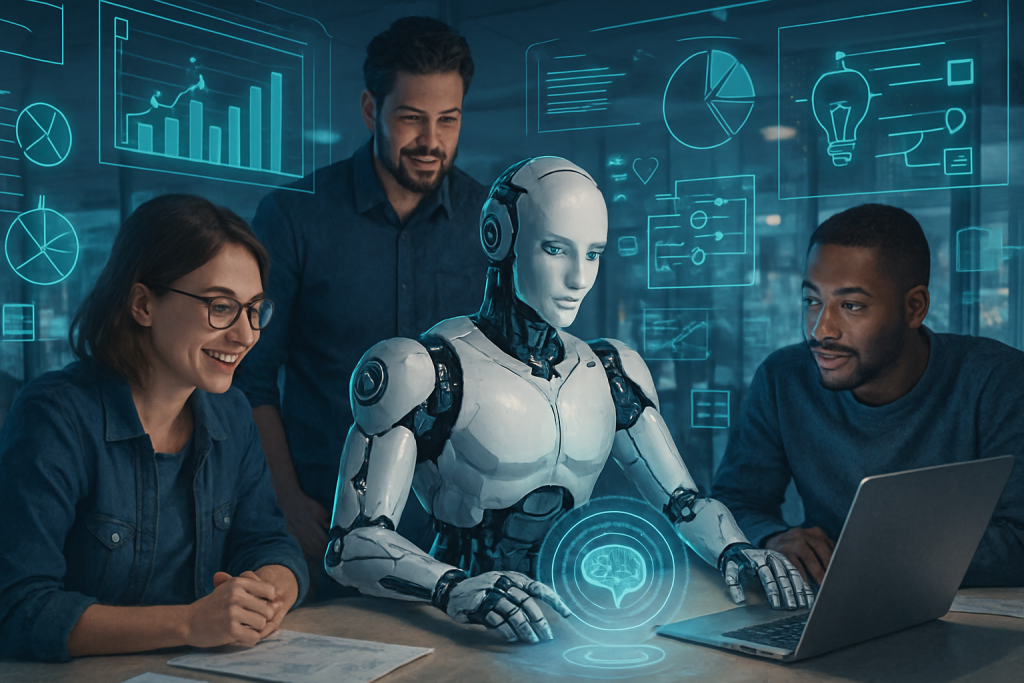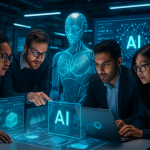Okay, folks, buckle up. Remember all those sci-fi movies where robots started doing *our* jobs? Well, according to OpenAI’s Sam Altman, that future isn’t just knocking- it’s kicking down the door. In a bombshell announcement on July 7th, 2025, Altman declared that Artificial General Intelligence, or AGI, is about to clock in and start earning a paycheck. Or, more accurately, start *replacing* paychecks. Think Skynet, but hopefully less… murderous.
He’s talking about AGI agents performing real-world jobs within the next year. Not just crunching numbers or writing marketing copy (which, let’s be honest, they’re already pretty good at), but actually thinking, deciding, and acting autonomously. Imagine having a personalized AI “team” at your beck and call. Sounds amazing, right? Like having Tony Stark’s Jarvis, but without the snark and billionaire baggage. But hold on, because there’s a lot more to unpack here than just shiny new tech.
Let’s dial it back a bit. What exactly *is* AGI anyway? We’ve been hearing about AI for ages. Your phone has AI, your fridge probably has AI, even your toaster might be secretly plotting against you with AI. But that’s all narrow AI- designed for specific tasks. AGI, on the other hand, is the holy grail. It’s AI that can understand, learn, and apply knowledge across a wide range of tasks, just like a human. It’s the kind of AI that can not only play chess but also write a sonnet, diagnose a disease, and then explain why pineapple doesn’t belong on pizza (because it doesn’t, end of discussion).
The journey to AGI has been a long and winding road, paved with hype, disappointment, and the occasional existential crisis. Remember ELIZA, the early natural language processing computer program from the 1960s? It could simulate a psychotherapist, but it was basically just regurgitating your own words back at you. Then came the expert systems of the 80s, which were good at specific tasks but brittle and unable to handle anything outside their narrow domain. And now, with the advent of powerful neural networks and massive datasets, we’re finally seeing AI that can truly learn and adapt.
So, what does Altman’s announcement really *mean*? On the one hand, he’s promising unprecedented productivity gains. Imagine a world where AI handles all the mundane, repetitive tasks, freeing up humans to focus on creativity, innovation, and, you know, actually enjoying life. Think of the medical breakthroughs, the scientific discoveries, the art and music that could be created. It’s a utopian vision straight out of a Gene Roddenberry script.
But then there’s the dark side. Altman himself acknowledges the profound implications for wealth distribution and societal power structures. If AI can do most jobs better and cheaper than humans, what happens to the millions of people who rely on those jobs to survive? We’re talking about potentially massive unemployment, increased inequality, and social unrest. It’s a dystopian vision straight out of a Philip K. Dick novel. And let’s not forget the potential for misuse. In the wrong hands, AGI could be used to create sophisticated propaganda, manipulate markets, or even wage autonomous warfare.
Which companies are going to be most affected? Obviously, OpenAI stands to gain a lot. But so do other AI powerhouses like Google, Microsoft, and Amazon. Any company that can leverage AGI to automate tasks and improve efficiency is going to have a huge competitive advantage. But what about the companies that *can’t* adapt? Or the industries that rely on human labor? We’re talking about potentially massive disruptions across the board, from manufacturing and transportation to customer service and even creative fields like writing and design. Sorry, folks, even this gig might not be safe.
Politically, this is a powder keg. Governments around the world are already grappling with how to regulate AI. From data privacy to algorithmic bias, there are a lot of thorny issues to resolve. And now, with the prospect of AGI entering the workforce, the stakes are even higher. We need to start thinking seriously about policies like universal basic income, retraining programs, and regulations to ensure that AI is used for the benefit of all, not just a select few. The alternative is a society where the rich get richer and the poor get replaced by robots. And nobody wants that, except maybe the robots.
Ethically, the questions are even more complex. What rights should AGI have? Should it be treated as property, or as a sentient being? Who is responsible when an AGI makes a mistake? And how do we ensure that AGI is aligned with human values? These are not just abstract philosophical questions. They are real, practical issues that we need to address now, before AGI becomes fully integrated into our lives. We need to have a serious conversation about the kind of future we want to create, and how we can use AI to get there.
Financially, the impact is going to be enormous. The companies that develop and deploy AGI are going to become incredibly valuable. But the companies that are disrupted by AGI are going to struggle. We’re talking about a potential transfer of wealth on a scale that we’ve never seen before. And the overall economic impact is uncertain. On the one hand, AGI could lead to massive productivity gains and increased economic growth. On the other hand, it could lead to widespread unemployment and social unrest, which would be bad for everyone.
So, what’s the bottom line? Sam Altman’s announcement is a game-changer. It signals that AGI is closer than we think, and that it’s going to have a profound impact on our lives. Whether that impact is positive or negative depends on the choices we make today. We need to start thinking seriously about the ethical, political, and economic implications of AGI, and we need to start working together to create a future where AI benefits all of humanity. Otherwise, we might just end up living in a real-life version of *The Matrix*, only with less cool leather jackets and more soul-crushing automated labor. And nobody wants that.
Discover more from Just Buzz
Subscribe to get the latest posts sent to your email.


